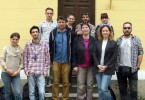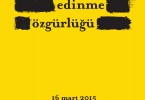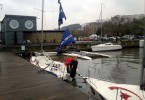About 3 million candidates will enter the race at the local elections scheduled for March 29 in Turkey for the post of mayor in 2,123 municipalities, village headsman (muhtar) in some 36,000 villages and membership in the municipal and local councils. Out of the 3 million candidates some 500,000 will win the race.
Local elections in many countries do not usually come with the fanfare that general elections exhibit; but not so in Turkey. Since fall last year political parties launched their campaigns full steam and the bickering between them is expected to get increasingly loud as March 29 approaches.
Candidates from 20 political parties as well as independents will be running for the much coveted seats. But the real race will be run between the governing Justice and Development Party (AKP) of Prime Minister Tayyip Erdogan, main oppostion Republican Peoples Party (CHP) of Deniz Baykal, Nationalist Action Party (MHP) of Devlet Bahceli, Democratic Left Party (DSP) of Zeki Sezer and Democratic Society Party (DTP) which polls the votes of Turkey’s Kurdish citizens, especially in the southeastern provinces.
In the previous local elections in 2004 AKP mayors won in 12 major Turkish cities including, Ankara, Istanbul and Adana. In other 46 cities out of 81, AKP candidates came on top as mayors. On March 29, the race seems to be close in cities like Izmir, presently run by a CHP mayor, Diyarbakir which went to DTP and Kocaeli, also under a CHP administration. Long before the election campaign was launched Tayyip Erdogan is known to give instructions to his party organization that he “wants” Izmir and Diyarbakir to be won over this time.
CHP has introduced Kemal Kilicdaroglu as a candidate for Istanbul mayor. Kilicdaroglu, currently a parliament member, won popularity in recent months by revealing corruption cases against the AKP government and bureaucracy. His revelations lost Dengir Mir Fuat Mehmet Firat and Saban Disli their jobs as deputy chairmen of AKP. CHP is banking on Kilicdaroglu’s popularity to challenge Kadir Topbas as mayor of metropolitan Istanbul. However, pundits observe that Kilicdaroglu as an unassuming former finance ministry auditor has little chance against Topbas who has launched colossal public projects in the city during the last few years.
Ankara is a more likely constituency where the race might be run close. AKP’s present mayor Melih Gokcek is beleaguered with many counts of corruption charges, including selling natural gas meters to dwellers on exorbitantly high prices revealed by Kilicdaroglu. CHP’s candidate for Ankara is Murat Karayalcin who actually served as Ankara mayor between 1989 and 1993. Karayalcin,65, also served as minister in previous coalition governments headed by Tansu Ciller, including a brief span as Turkey’s foreign minister. However, he is not a CHP member. He came over to CHP from Social Democratic Populist Party (SHP) that he formed after resigning from CHP.
Izmir is another bone of contention between AKP and CHP. Izmir has traditionally been a stronghold of social democratic parties and the present mayor Aziz Kocaoglu belongs to CHP. Kocaoglu accessed the mayor’s office after the extremely popular mayor Ahmet Piristina died at the age of 52 in 2004. The general feeling in Izmir is that if Piristina were alive no other candidate would stand a change to win the election. However, in house bickering within CHP has been decreasing a Kocaoglu victory there.
Diyarbakir is of course a different case. The city’s DTP mayor Osman Baydemir was personally the target of Erdogan’s wrath several times. During his visit to Diyarbakir last year, Erdogan complained that the municipal administration “Left the city in squalor.” However, the rubbish on the streets and shuttered shops were the result of not a deficiency in municipal services but a political boycott against the government. AKP introduced Kutbettin Arzu, one of its deputies in the parliament as a candidate for Diyarbakir. Although Arzu is the child of a Diyarbakir family, AKP’s chances of winning the post of mayor in this city looks slim. Erdogan’s comment that he would “conquer” the city’s municipality seems to have angered the locals.
One would normally expect local constituencies have a say in the selection of candidates they would be choosing for their local governments; not so in Turkey. Just like the candidates running for seats in the legislative assembly at general elections, in local elections too, the candidates are handpicked and announced by the leaders of each party. So the Turkish public witnesses a flurry of transfers between the political parties by hopefuls who are not bestowed the favor of being selected as candidate by their leader. For example, the mayor of Sanliurfa in southeastern Turkey, Ahmet Esref Fakibaba went over to Felicity Party (SP) when Erdogan did not pick him up. Fakibaba had won more than 50 percent of the votes in Sanliurfa in the 2004 local elections while SP got a miniscule 2.2 percent. SP is the last successor of a series of Islamic oriented parties that were shut down by the Constitutional Court. Erdogan’s AKP was born in 2002 when he parted ways with Necmettin Erbakan, the politician that introduced political Islam in the late 19’/60s on stage in Turkey.
In CHP the situation is no better if not worse. Baykal seems a bit confused about whom to pick as candidates for mayors. In January he proudly announced his candidates for major cities including Adana. But ten days later, apparently he changed his mind and appointed another candidate causing a lot of frustration in his party’s Adana organization.
As it happens at every election period, the selection of candidates cause a turmoil in party organizations with scores of frustrated party members announcing their resignation.
The Turkish public is also witnessing some very colorful contrapositions in election campaigning. CHP’s Baykal shocked and awed some staunchly Kemalist followers when he appeared at a ceremony where some women in hijab, – that is the Islamic attire covering the body from head to toe called charshaff – were matriculated into CHP. Baykal with his own hands affixed the six-arrowed party pin on the hijabs. The CHP leader defended his act on the pretext, “to save these innocent citizens from the stranglehold of Islamic sects.”
Although muffled, Baykal’s campaign drew some disapproving remarks from his own deputies like Prof. Necla Arat. According to Arat, CHP’s mission was to promote the principles of Kemal Ataturk not to cave in to political Islam. But CHP had more in store to appease the “pious” electorate. Kocaeli Mayor Safa Sirmen few days after the matriculation ceremony announced that he would provide space for Koran courses in the neighborhoods of his municipality “for those who want to learn the Koran correctly.” The pretext again was that in the illegal Koran courses Turkish youngsters were fed anti-republican superstitions.
But the campaign for the “pious” shattered when the hijab wearing women announced they were leaving CHP en masse because the candidate they supported was not selected by Baykal. Worse still, the candidate who was not chosen, Emin Atmaca accused the assistant general secretary of CHP, Mehmet Sevigen, of asking for bribes in order to introduce him as a mayoral candidate for Eyup, in Istanbul.
While CHP was striving to woo the votes of the pious citizens, AKP was also straying from observing the rules of Islam by organizing “candidate promotion parties” where alcohol was served to the guests. In Datca, on the Aegean coast, Edirne and Artvin AKP’s local candidates were “introduced” to the public to the accompaniment of “raki.”
CHP’s flirtation with Islam provided Tayyip Erdogan the occasion to hit the nail on the head. “So you were not going to exploit religion for your political interests!” he quipped at Baykal.
“Bribery!” shouted the opposition when the governor of Tunceli, in southeastern Turkey, began distributing household amenities like washing machines, TV sets, computers and even furniture. According to press reports some of the washing machines went to homes without running water. The outcry was not completely without justification. Although there was no official link between the goods distributed and AKP, only the party running the government could order its governor to launch such a campaign. By the way, for the last two general elections, in 2002 and 2007 AKP was not able to win either of the two seats that Tunceli has in the legislative assembly. And the distribution campaign started in Nizamiye, a small town in the province that happened to be the hometown of CHP’s Istanbul candidate Kemal Kilicdaroglu. Besides, Kamer Genc, the independent Tunceli deputy in the parliament has been a thorn on the side of AKP with his continuous attacks on the governing party.
To be a candidate at local elections is by no means free. Of course the amount of money that a hopeful should consider spending varies according to the size of the constituency he is running at. Leaving aside major cities like Istanbul, Ankara or Izmir, even in the small towns ofAnatolia the cost for running ranges between 25,000 to 50,000 TL.
For example, if you want a campaign tune exclusively for yourself you have to spend something like 3,000 to 6,000 TL. A promotional video would cost to the tune of 10,000 to 20,000 TL. Of course, you have to have a bus equipped with amplifiers to conduct your campaign. That would come for 10,000 to 20,000 TL for two months. Giveaways like pens, key holders, lighters with your logo and photograph on would cost a minimum of 10,000 TL. Plus, of course, there will be posters and streamers. You would also need hired help. So it is not a cheap thing to benefit from the democratic system.
Election campaigning also proves to be useful for the jobless. According to Vatan newspaper, a citizen whose entrepreneurship should not be taken lightly set up a team called “Applause Group.” Resat Yasar, 40, who has been organizing events like weddings, openings and other public gatherings in Gaziantep says he is ready to serve the candidates who need help. The group, would follow the candidate in his or her electioneering and start cheering as he mounts the rostrum to address the public. Although the group’s services are so far remain unrequited, they gathered at a wedding lounge and rehearsed their skills.
“Business went from bad to worse in recent months. So I decided to set up this group, recruiting young and jobless people to work during the election campaign. We shall carry and shout slogans and provide support for candidates. We are also rehearsing how to lift candidates on our shoulders and cheer, shouting, ‘The greatest candidate is our candidate.”
So far Yasar refrains to divulge his price list.
At least for the time being Turkey is moving towards March 29 elections with a lot of good humor; it seems.







